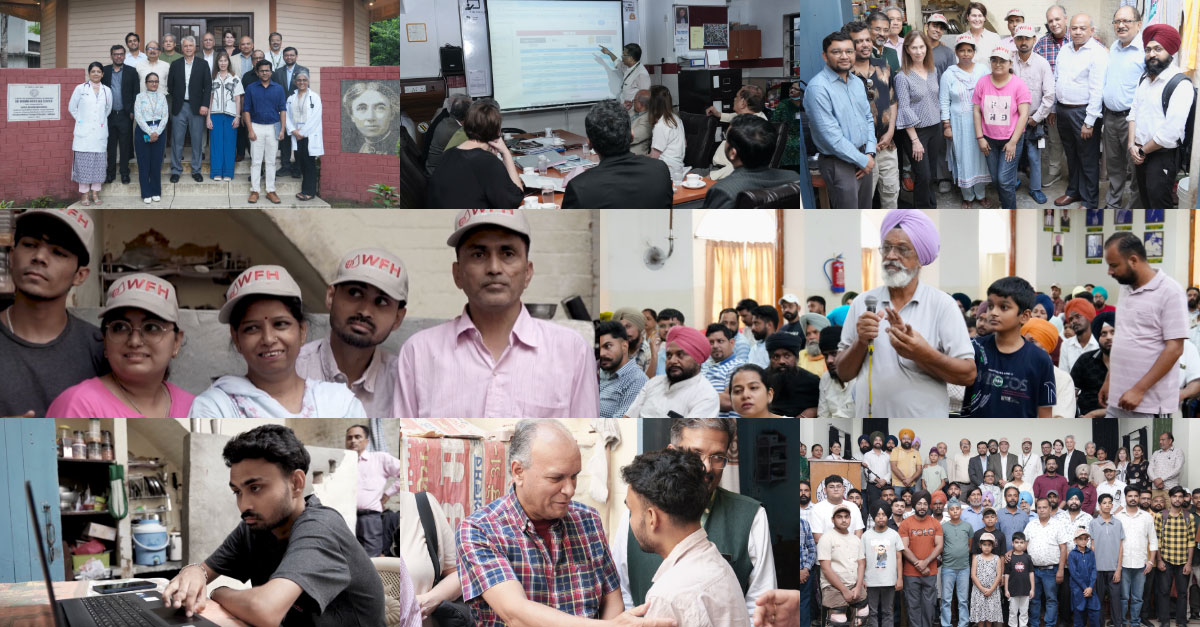WFH support in India is provided by the WFH Humanitarian Aid Program, the WFH Path to Access to Care and Treatment (PACT) Program, the WFH Twinning Program, and the WFH International External Quality Assessment Scheme (IEQAS). The WFH works closely with the national member organization (NMO) in India—the Hemophilia Federation of India (HFI)—to maximize the impact of these endeavours in the country.
In Jagraon, India, the WFH Humanitarian Aid Program delegation met Abhishek, 29, who was diagnosed with hemophilia at six months old. “I completed my entire education—including Bachelor’s and Master’s—while bedridden. I only started my treatment after completing my education. Before that I used to move by crawling,” he said. For fourteen years, Abhishek was confined to his bed. “If I had to go out during that time, I would crawl, like little children do,” he recalled. After receiving treatment in 2018, he underwent surgery. Today, he is fully independent and is able to walk around with ease.
If [Abhishek] were to buy factor for hemophilia and surgery and post-surgery provisions, it would’ve cost him at least [USD $11,500]… The WFH is supplying [factor] to the Hemophilia Federation of India (HFI) and HFI then sub-divides and gives it to patients of need; [ Abhishek] was a big beneficiary for that.
—M Joseph John, MD, Head of Clinical Hematology, Christian Medical College (CMC) Ludhiana
At Christian Medical College (CMC) Ludhiana, the impact of the WFH Humanitarian Aid Program was evident in the experiences of two patients. Harshmeet Singh underwent a total knee replacement eight months ago. He received donated factor throughout his treatment, including during post-surgery physiotherapy. Gurpreet Singh shared how he was treated for gall bladder stones. “Without the donated factor, getting a procedure done would have been impossible,” he explained. Thanks to WFH Humanitarian Aid Program support, these life-changing procedures were made possible.
From individual transformations to community-wide impact, the visit underscored how humanitarian aid and comprehensive care systems are reshaping the future for people with hemophilia in India. “I am very happy to see how CMC Ludhiana is serving the patients, not only from Ludhiana, not only from Punjab but probably from entire North of India,” says Harshal Kale, Regional Manager for the WFH. “The kind of complex surgeries CMC Ludhiana has performed has changed many lives.”
Almost 68 million IUs of factor were donated to India through the WFH Humanitarian Aid Program in 2024. Since 2015, almost 439 million IUs of factor have been donated to India. To find out more about the WFH Humanitarian Program, please click here.
About the WFH Humanitarian Aid Program
The WFH Humanitarian Aid Program improves the lack of access to care and treatment by providing much-needed support for people with inherited bleeding disorders in developing countries. By providing patients with a more predictable and sustainable flow of humanitarian aid donations, the WFH Humanitarian Aid Program makes it possible for patients to receive consistent and reliable access to treatment and care. None of this would be possible without the generous support of Sanofi and Sobi, our Founding Visionary Contributors; Bayer, CSL Behring and Roche, our Visionary Contributors; Grifols, our Leadership Contributor; and Takeda, our Contributor. To learn more about the WFH Humanitarian Aid Program, visit www.treatmentforall.org.













